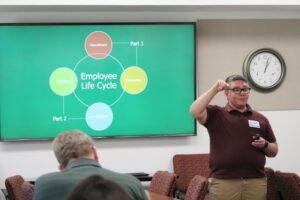A Partnership between Faculty Success and the Office of Inclusive Excellence Results in a New Training for Department Chairs and Heads
When we opened our nine-hour workshop with university department chairs and heads with this statement, we had their attention.
In the student success, faculty success, and general higher education literature, the need for multicultural competence in university leaders is clear. Yet, the academy has often failed to provide opportunities for leaders to develop these skills. Contrary to Vince Lombardi’s assertion that leaders are made through hard work, we often collectively subscribe to the idea that leaders are born, not made. We assume that if a person has been an effective researcher, surely they were born with the skills to successfully lead a department! Further, the unceasing demands and political landscapes of higher education often leave academic leaders feeling isolated in their leadership roles and wondering, “Does anyone else deal with this? Does anyone have a solution?”
In no area of leadership is this truer than when it comes to creating an educational environment where students, faculty, and staff feel welcomed, valued, and affirmed. Fortunately, we have decades worth of research describing evidence-based practices that move the needle on diversity, equity, and inclusion (DEI) goals. We know that diverse teams are more productive and effective. We know that the student populations enrolling at universities are growing more diverse. We also know that, to have diverse research teams and to educate diverse students, it is critical that we have a diverse faculty. That’s where a culturally competent department chair or head can make an enormous positive impact.
The Scope and Impact of CHIIE

The Office for Inclusive Excellence has partnered with Faculty Success to create a professional development opportunity called the Chairs and Heads Institute for Inclusive Excellence (CHIIE). Modeled after similar programming for faculty, CHIIE supports academic leaders by examining the most effective strategies to promote DEI in academic departments. Leaders also get to try integrating inclusive practices into all departmental functions and structures with each other—a rare experience for department leaders! Specifically, chairs and heads learn to implement evidence-based practices to recruit, retain, and promote a diverse faculty and staff, develop strategies to navigate the challenges of leading a division-wide effort to create greater inclusion for students, faculty, and staff, and develop a comprehensive DEI strategic plan for their department.
So far, more than 35 department chairs and heads have attended CHIIE. According to participants, CHIIE seems to be a valuable and worthwhile experience! We have been collecting and analyzing anonymous program evaluations across all CHIIE participants. In response to open-ended survey questions, one CHIIE participant said, “This work is vital, and I am so grateful to be a part of it.” Another acknowledged some initial reticence to engage in CHIIE, saying, “I was very grateful to have the opportunity. At first, I was reluctant [to attend], but after attending, I thought it was immensely helpful.”
While learning is CHIIE’s primary focus, unlearning is also central to this effort. Chairs and heads spend significant time unlearning the pipeline myth—the mistaken belief that the solution to higher education’s diversity issues lies solely in recruitment and not in the retention, promotion, and development of faculty and staff. They are prompted to ask themselves why we’ve always done things this way, unpacking assumptions about outmoded systems and processes. They work through how to intentionally search for faculty members, and they question (and laugh) at the idiosyncratic practices we have developed and perpetuated in searching for, onboarding, and mentoring faculty and staff.
Chairs and heads also learn from each other. Surprisingly, these leaders have little interaction with each other. CHIIE allows them to have deep, vulnerable conversations with peers. The environment encourages them to collaborate, partner, and strategize to become better, and, in so doing, make the university stronger. After their experiences, CHIIE participants are looking for more faculty to join them in this work. As one participant said, “I would advocate for similar types of content for all faculty.”
The next CHIIE experience will take place from 12:30-4:30 pm on Friday, November 10 and Friday, November 17. Registration is open for all departmental leaders and can be found on the CHIIE Faculty Success website.
Author Information: This blog post was authored by Shannon Archibeque-Engle. Shannon is the Associate Vice President for Inclusive Excellence and a member of the Faculty Success team.
